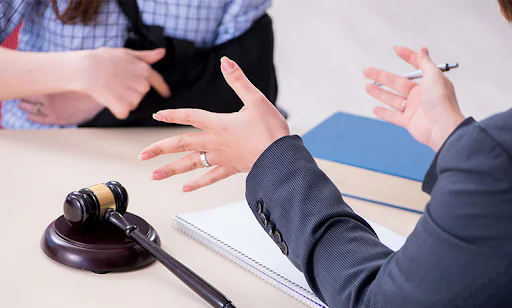When a car crash occurs, it’s necessary to understand what action to take when not at fault. This is key to safeguarding your rights and pursuing justice for your injuries.
Steps to Take After Minor Car Accident
Here are steps to take after an auto collision that isn’t your fault.
1. Stay Calm
After a car crash, you should remain at ease and examine yourself for any injuries. If you’re harmed, avoid unnecessarily movements to prevent causing further damage. Check if other drivers or your passengers have sustained any injuries. Offer any help you can under the circumstances, including providing first aid.
If possible, move out of harm’s way to a safer location away from the busy traffic. You can move near a parking lot or to an area with sufficient lighting. Use your hazard lights to signal other motorists of the incident.
Staying in a safe area minimizes the risk of additional collisions from oncoming traffic. Once you’re sure of your safety, you can turn your attention to reviewing the situation.
2. Request for Emergency Services
It’s easy to ignore minor injuries. But, if left untreated, they can become complicated. If you’re seriously harmed, you require urgent medical care. Call an ambulance and notify the dispatcher of details such as:
- Your location
- A brief description of the incident
- Details about any injuries
Getting immediate help ensures timely treatment of your injuries. Plus, it assists in documenting an official report, which is key for insurance and legal purposes.
3. Call the Police
Reporting accidents that are not your fault vary from state to state. However, fleeing the accident scene remains a crime everywhere. Even if you can’t notice any severe injuries, stay calm and inform the police.
They will record the details of the incident, examine the cause, and produce a report. Not calling the law enforcers can lead to severe legal consequences, like fines or even imprisonment. When notifying the police, ensure to provide your location and a short description of the incident. When they arrive, follow their instructions and provide honest answers to their questions.
4. Document the Scene
Even if the accident is a small fender bender, taking notes of the incident is crucial. Use your phone to record the following information:
- Pictures of all damaged vehicles from different angles. Ensure to capture the back, front, and sides.
- Videos and images of the road conditions. Include any traffic signs and any skid marks that can be clearly seen.
- Capture any visible injuries.
Moreover, recording the exact address and time of the incident including nearby landmarks is key. Having these details can be helpful, especially when documenting a police report and insurance claim.
5. Gather Information
When police arrive at the scene, you and other drivers will provide information about the accident. But having your own set of records regarding the incident is in your best interest. This will strengthen your account of events, and expedite investigations. Collect all relevant details, including:
- Full description of the accident
- Speed of the vehicles
- Insurance company names
- Policy number for drivers
- Witness contacts and statements
While doing this, remember to be as accurate and specific as possible. The at-fault party is accountable for informing their insurance company about the accident. Sadly, many people don’t follow the law. Collected information provides proof that the collision occurred and resulted into damages. Plus, the evidence will be required when filing a claim with the responsible driver’s insurance.
6. Notify Your Insurance Company
Auto insurance policy terms require policyholders to always inform their insurer about an incident that can trigger coverage or litigation. Accidents that appear minor may become complicated, requiring insurers intervention. In addition, making the provider aware of the incident helps them to start the lengthy and complicated claims process.
You might think the other driver’s insurer will automatically pay damages if you weren’t responsible for the incident. Unfortunately, that isn’t always true. Insurers are in business, always looking to reduce costs and maximize their profits.
They will try to push all the blame on you or offer lowball settlements. If you’re in doubt, seek advice from a lawyer familiar with car accident cases to guide you through the whole claims process.
7. Seek Medical Attention
Even without speeding, a car crash can cause severe injuries. The full extent of the impact of the collision may not be immediately visible. Only a thorough medical review can unearth any underlying issues.
This is useful in getting urgent treatment. It also allows you to record your injuries to help you file a lawsuit against the at-fault party. Some states require you to seek medical intervention within a specified timeline. This enables you to increase your chances of recovering compensation.
8. Meet with an Attorney
Handling the insurance process can be confusing. That’s why you need to see a lawyer to maximize your odds of winning the claim. A competent lawyer comes with experience and professionalism. Besides, they have the expertise to handle the litigation proceedings. That allows you to focus on the recovery process.
How Long Do You Have to Sue After a Car Accident
Dealing with a car crash lawsuit is dependent on where you live. The statute of limitations dictates the timeframe, and it can range from one to four years.
However, certain factors can affect the rule:
- The legal timeframe may be extended depending on the severity and complexity of the injuries sustained.
- The use of the discovery clause allows you to start counting from the date you experienced the injury as opposed to the accident date.
- Each claim may have its own statute of limitations.
Your attorney’s can explain more about your state’s specific requirements. Failing to follow required timeframes can shut the door on pursuing a case.
What to Do After a Minor Car Accident Injury
People get confuses that what to do after a car accident injury. Some people ignore seeking treatment, thinking they’re fine. This can be a bad idea because some injuries don’t manifest right away. If managed poorly, they can worsen and become complicated.
A thorough examination by the doctor will help to rule out severe injuries, increasing your chances of quick recovery. Plus, medical records provide crucial evidence when filing for a personal injury claim later.
Conclusion
Predicting when an accident will happen isn’t possible. Not knowing what to do after it occurs, and it’s not your fault, can worsen the situation. That’s why consulting an experienced car accident lawyer can be invaluable to help enhance the final outcome of your case. At Husain Law and Associates Truck Accident Lawyers, we know how to handle all the legal complexities related to your case. Schedule a free consultation at (713) 804-8149 to help you pursue your rightful compensation.











